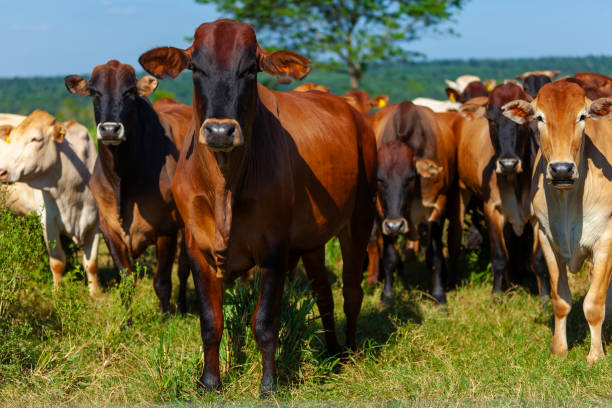Agriculture and livestock, the backbone of the Chadian economy, are losing their robustness. The main actors of these two economic levers, each rainy season, rise up against each other, cling and tear each other apart in a bloodbath.
The bloody conflict between farmers and herders
Hunger drives the wolf out of the wood. Global warming and its endless string of misfortunes, the very rapid drying up of temporary waterways and the disappearance of fresh grass, are pushing breeders to leave their area. The latter in search of green pastures and water points gradually descend from the Sahelian zone (North and Center of Chad) to meet the first rains: this is transhumance. The latter brings about a (geographical, only) rapprochement between nomadic herders (with livestock) and sedentary farmers (who stay close to plowed fields in which the crops are mature).

In Chad, the activities which concern both agriculture and livestock breeding, known as “agro-pastoral”, have until now been rudimentary and archaic. Natives (sedentary) still practice slash-and-burn and extensive shifting agriculture, so traditional. This technique consists of clearing several hectares of land by fire in order to maximize the yield. This is also what causes the proximity of the two “rival” communities. The herds of hungry oxen, thirsty and exhausted by a long journey, barely arrived on a green space, throw themselves on the stalks, the ears of cereals at maturity and devour them with pleasure under the docile and complicit gaze of their “masters”. . This destruction of fields is the flame that lights the fuse of dynamite. As a result, a bloody conflict breaks out between these two communities which constitute the pillars of the Chadian economy.
50% of community incidents related to conflicts between farmers and herders
The consequences that flow from these sad periodic events are cataclysmic. The United Nations (UN), in a very damning report published in November 2022, claimed that the inter-community clashes in the country of Toumaï had resulted in more than 500 dead, 600 injured and more than 7,000 displaced. More than half of them are linked to conflicts between farmers and herders.
The worst is still to be feared because this inter-community tension is polarizing. The herders, who are almost all Muslims, own firearms that have been provided to them by certain ruling elites of the Muslim faith. For their part, the indigenous farmers, Christians or animists, rush to all kinds of bladed weapons (throwing knives, sabres, machetes, axes, etc.) for their self-defense. Young people, disoriented and demotivated by the regular devastation of their fields, desert the countryside and create an urban population explosion. This absence of labor is the channel through which the famine spreads at exponential speed in the villages and indirectly in the cities. On the markets, consumers and public authorities helplessly watch the soaring food prices. The volume of the grocery basket decreases drastically. In short, a socio-economic crisis is spreading across the country. If the N’Djamena authorities do not mention these interfaith clashes in their agenda, what appears to be a small spark will ignite. And, the country of Toumaï, cradle of humanity, will sink into irreversible chaos: civil war.
Extinguish the devastating flame
To eradicate this scourge, the traditional authorities (heads of land, village, customary, etc.), religious (pastors, priests and imams), administrative (governors, prefects, sub-prefects, etc.), military and judicial must work in symbiosis. In the various places of worship, the messages of peace, tolerance, love, national unity and reconciliation must resound. Seminars and workshops that promote social cohesion and political stability should not only be held in large cities, but also in rural areas. The exchanges must extend over the fields and in several vernacular languages. The media, especially rural and community radio, also play a very important role in the cohesion of the social fabric.
However, safeguards must be erected to curb any recalcitrants in their tracks. Hence the entry into the fray of the military and judicial authorities. The former could carry out the systematic and immediate disarmament of farmers and breeders who illegally possess weapons of war. The latter would regulate nomadism throughout the Chadian territory by tracing transhumance corridors and would enforce the texts of the Penal Code in the event of non-compliance. Finally, to curb the flow of transhumance, the Chadian State could, through the intermediary of donors, set up meat, skin, bone, etc. processing industries. Breeders who export live cattle to neighboring countries (Nigeria, Cameroon, CAR) will no longer have any reason to travel a long distance because the buyers (companies) will already be there. These companies, in addition to limiting the movement of livestock, will absorb a large number of unemployed young people.
